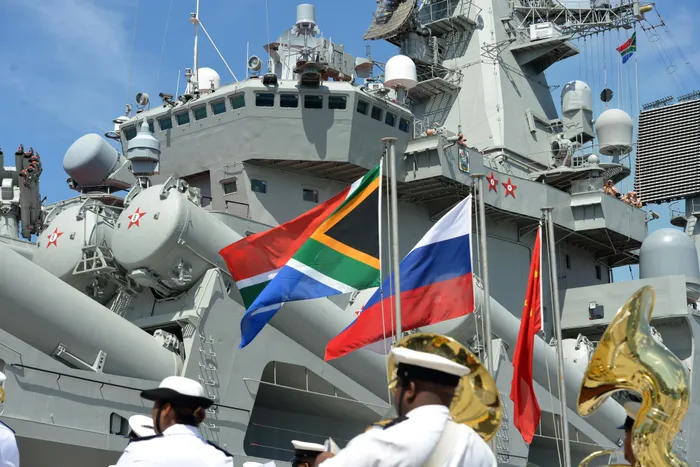SA dives into hot water over naval drills with Russia, China

Picture: Courtney Africa/African News Agency (ANA) – The Russian Cruiser Marshal Ustinov was welcomed by the SA Navy band in Cape Town in November 2019 when South Africa hosted Russia and China for a multinational maritime exercise. South Africa has courted controversy after announcing that it would participate in the second part of the naval exercises, name Mosi II, at a time when Russia is fighting a war over territory in Ukraine.
By Sizo Nkala
The South African Defence Force (SANDF) announced that the SA Navy would hold joint military exercises with China’s People’s Liberation Army Navy and the Russian Federal Navy from February 17 to 27.
Named Mosi II, the exercise, which will see about 350 SA Navy personnel participating, will take place in the Indian Ocean off Richards Bay and Durban on South Africa’s east coast. As the name suggests, Mosi II is a sequel to Mosi I which was conducted near the Cape Town port in November 2019.
However, the coming exercise has attracted criticism from some quarters including South Africa’s main opposition party, the DA, arguing that the holding of the military drills makes the government’s claims of neutrality in the ongoing Russia-Ukraine war hollow. The US government said it is worrisome for any country to be holding military exercises with Russia amid its invasion of Ukraine.
However, South Africa’s ministers of Defence and International Relations, Thandi Modise and Naledi Pandor respectively, have jumped to the defence of the naval exercise, insisting that it was a natural course of the country’s diplomatic relations with China and Russia. Pandor criticised the US for its selective condemnation of Russian aggression while ignoring other acts of aggression committed by such countries as Israel.
She said South Africa was a sovereign country with the right to pursue diplomatic relations with other countries. Modise pointed out that South Africa has held joint military exercises with countries such as the US, UK and France among others without any uproar.
Russia’s Foreign Minister, Sergei Lavrov, who met with Pandor in Pretoria on his Africa tour, stressed that there was nothing scandalous about “Exercise Mosi” and said that his government had provided all the necessary information.
Be that as it may, events of this kind cannot be divorced from the context in which they take place. Mosi II comes at a time of heightened geopolitical tensions between Russia and China on the one hand and the US and its Western allies on the other.
This has culminated in a trade war between the US and China and imposition of economic and diplomatic sanctions on Russia by the US and its allies following Moscow’s decision to invade Ukraine in February last year.
The frosty relations between the major powers have triggered intense competition for spheres of influence across the world including in Africa. Just this month alone has seen important political figures from the US, Chinese and Russian governments visiting several African countries.
The Chinese Foreign Minister Qin Gang toured five African countries in the first half of this month while the US Secretary of the Treasury Janet Yellen and the Russian Foreign Minister Sergey Lavrov are conducting their own tours of the Continent.
During his tour, Qin argued that Africa should not be an arena of competition between major powers as it does not benefit the continent. However, while in Zambia, Yellen took aim at the country’s Chinese debt and urged Beijing to restructure the debt. Her government has earlier accused China of using debt to undermine the sovereignty of African countries.
When the US Secretary of State Anthony Blinken visited Africa in August last year, he unveiled the US Strategy towards Sub-Saharan Africa. The strategy document aimed pointed criticism at China and Russia claiming that “The People’s Republic of China (PRC), by contrast, sees the region as an important arena to challenge the rules-based international order, advance its own narrow commercial and geopolitical interests, undermine transparency and openness, and weaken US relations with African peoples and governments.
Russia views the region as a permissive environment for parastatals and private military companies, often fomenting instability for strategic and financial benefit.
“Russia uses its security and economic ties, as well as disinformation, to undercut Africans’ principled opposition to Russia’s further invasion of Ukraine and related human rights abuses.”
Hence, Mosi II should be seen within the context of the current geopolitical tension amongst the major powers. The US, China and Russia are aware of Africa’s geostrategic and geopolitical value, especially its significant mineral endowments that constitute the upstream of some of the most lucrative global value chains and its big voting bloc on global platforms such as the United Nations.
Russia has received considerable support from African countries at the UN on the question of its invasion of Ukraine. Africa’s voting patterns at the UN have seen the US campaign for the global isolation of Russia falter.
As such, on the one hand, Mosi II is a form of South-South security co-operation and the beginning of a departure from a global order dominated by the West. Building multidimensional South-South co-operation across the security, diplomatic, economic and cultural spheres is one of BRICS’ founding objectives.
On the other hand, the exercise is South Africa’s unequivocal assertion of agency, sovereignty, and independence in its foreign policy despite being aware of the West’s objection to the military drill.
Dr Sizo Nkala is a Research Fellow at the University of Johannesburg’s Centre for Africa-China Studies